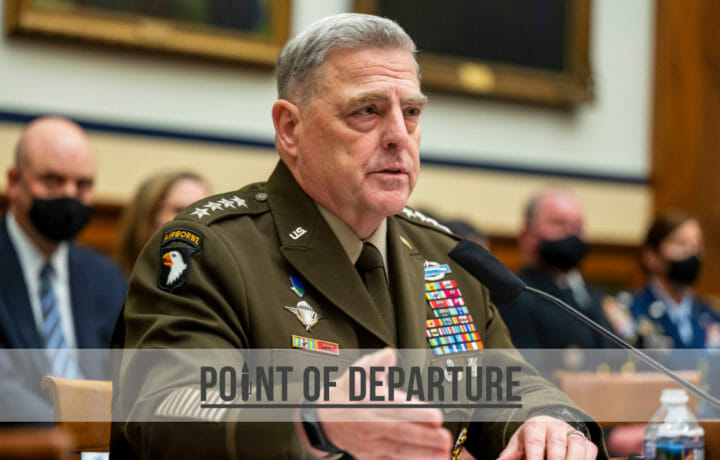It was a defining moment in the recent Senate Armed Services Committee hearing on the withdrawal from Afghanistan. Senator Tom Cotton of Arkansas, himself a veteran of Iraq and Afghanistan, looked down on the embattled Chairman of the Joint Chiefs of Staff, Army General Mark Milley, and asked a final question.
“General Milley, I can only conclude that your advice about staying in Afghanistan was rejected… I understand that you’re the principal military adviser, that you advise, you don’t decide, the president decides. But if all of this is true General Milley, why haven’t your resigned?”
The question itself was one that had been posed numerous times during the Chairman’s tenure. Since assuming the role in 2019, Milley had been embroiled in more than a few controversies, increasingly the norm in what seem to be ever more divisive times. The question may have been rhetorical, posed simply to further politicize an over-politicized issue. But for Milley, it demanded an answered.
“My job is to provide advice. My statutory responsibility is to provide legal advice or best military advice to the president and that’s my legal requirement. That’s what the law is. The president doesn’t have to agree with that advice. He doesn’t have to make those decisions just because we’re generals. And it would be an incredible act of political defiance for a commissioned officer to just resign because my advice is not taken.”
Milley IN THE EYE OF THE STORM
Since stepping into his role as the Pentagon’s senior military advisor during the previous administration, Milley has seen one controversy follow another. On June 1, 2020, Milley accompanied the President from the White House into Lafayette Square for what he believed to be a review of National Guard troops serving in the capital. Milley issued a public apology, stating that he should not have been there since his “presence in that moment and in that environment created a perception of the military involved in domestic politics.”
In the wake of the November 2020 elections, Milley faced mounting criticism surrounding comments attributed to him in written works. From allegedly referring to the transition of power between administrations as a “Reichstag moment” to worrying that the former president could “go rogue,” Milley’s statements created a firestorm of controversy. While he freely admitted to granting interviews for several books, the remarks that drew the most attention all had a certain Simone quality to them: “My best friend’s sister’s boyfriend’s brother’s girlfriend heard from this guy who knows this kid who’s going with the girl who saw Ferris pass out at 31 Flavors last night.” The only thing missing is a Save Mark water tower over suburban DC.
Despite the storm of controversy, Milley has remained calm in the chaos. Few public figures have managed to draw the ire of both sides of the political divide, a fact often lost on a media intent on blurring the line between elected leaders whose only focus is on remaining in office and an internet that seems to inspire and entertain every conspiracy theory under the sun. In such a divisive era, that kind of ire is typically reserved for those trying to walk the tightrope between political extremes; doing so successfully inevitably angers one side or the other. And Milley has been remarkable in that regard.
While his penchant for blunt honesty has frequently proven controversial, Milley has consistently led with his values. When assessing the impact of the negotiations with the Taliban to withdraw from Afghanistan, Milley indicated that the deal had a devastating effect on “the morale of the Afghan security forces.” As to the veracity of that agreement, he noted that the Taliban “failed to fully honor… the Doha agreement.” When asked if he would describe the Kabul evacuation as an “extraordinary success,” Milley instead called it “a logistical success, but a strategic failure.” Blunt, but true.
So, it should come as no surprise that his response to Cotton was going to be just as blunt in driving home his personal values.
“You know, my dad didn’t get a choice to resign at Iwo Jima, and those kids there at Abbey Gate, they don’t get a choice to resign. And I’m not going to turn my back on them. I’m not going. They can’t resign so I’m not going to resign. There’s no way.”




